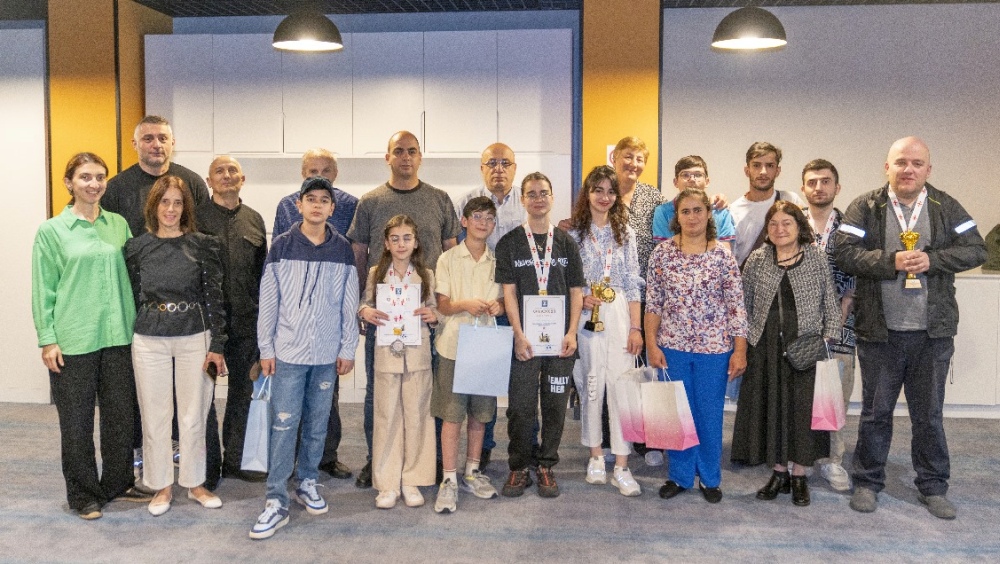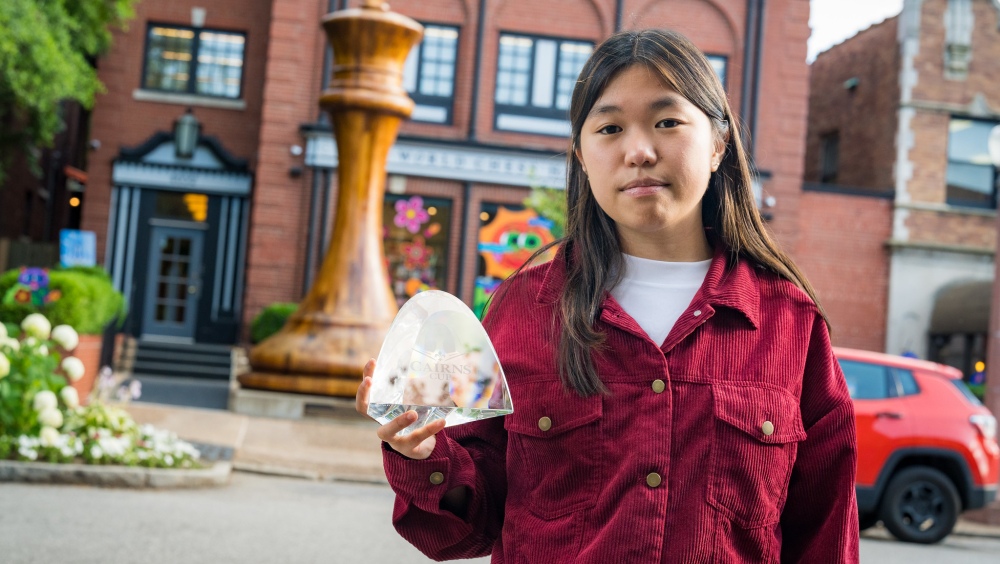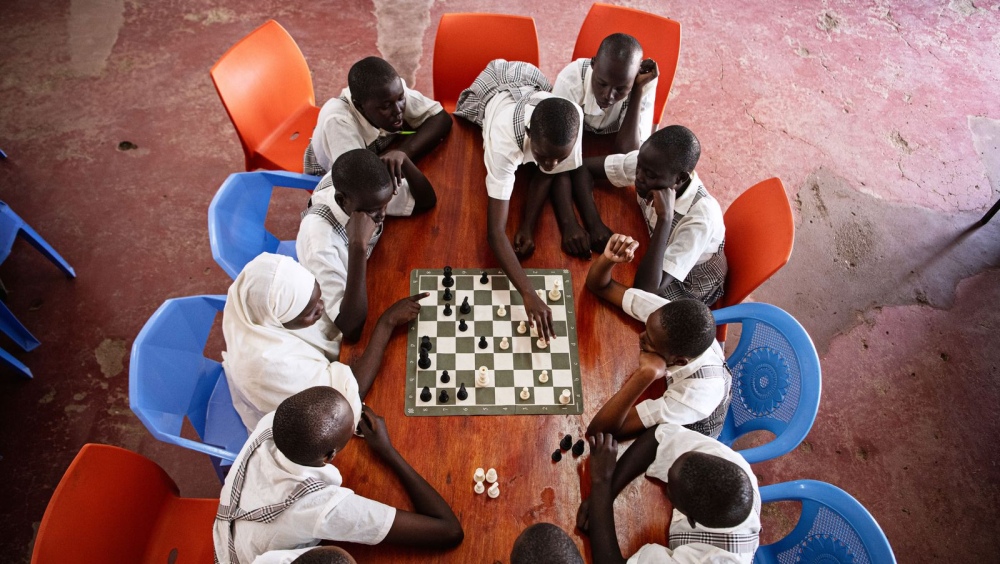Georgian Championship for People with Disabilities: Malania and Gogonadze clinch titles

Amirani Malania and Anano Gogonadze emerged as the winners of the 2025 Georgian Championship for People with Disabilities. The fourth edition of the event—a seven-round Swiss-system tournament—was held at the Ibis Styles Batumi Hotel in Batumi, from June 14–19. Organized by the Georgian and Adjara Chess Federations, the championship was financially supported by the Adjara Sports Department and attracted 14 participants. Male and female players competed in the same pool but were ranked separately. WGM Salome Melia, a member of the FIDE Commission for People with Disabilities, served as the tournament director. Open category winners: 1. Amirani Malania 2. Leri Talikadze3. Badri Tsetskhladze Women’s category winners: 1. Anano Gogonadze2. Tekla Gakhokidze 3. Anna Mgeladze
Carissa Yip wins 2025 Cairns Cup

IM Carissa Yip emerged as the winner of the 2025 Cairns Cup, completing a GM norm and taking home $65,000 for her first-place finish. The fifth edition of the elite women’s super-tournament took place in Saint Louis, at the World Chess Hall of Fame, from June 8–21. The Cairns Cup shares its format with other prestigious events like the illustrious Sinquefield Cup: a ten-player round-robin played with classical time control. This year’s edition featured a $250,000 prize fund—the largest in the event’s history. As expected, it was a tightly contested competition that came down to the wire. GM Humpy Koneru, IM Harika Dronavalli, and IM Alice Lee started strong and shared the lead through Round 6, when Alice Lee lost to IM Bibisara Assaubayeva and Humpy Koneru defeated Harika to pull ahead. However, Koneru’s sole lead was short-lived. In the next round, Carissa Yip—who had started the tournament with a loss—scored a crucial win over Koneru to catch up. Meanwhile, Alice Lee outplayed Alina Kashlinskaya to join the leading duo. In Round 8, Lee drew with Dronavalli, Koneru was defeated by Nino Batsiashvili, and Yip beat Assaubayeva to surge ahead. Heading into the final round as the sole leader with 5.5/8, Yip achieved a winning position against her closest competitor, Lee, but the game eventually ended in a draw, securing Yip the title. Lee finished second with 5.5/9, while Dronavalli completed the podium with 5/9 after Koneru lost her final-round game against Mariya Muzychuk. Photos: Saint Louis Chess Club / Crystal Fuller and Lennart Ootes
World Refugee Day: Chess as a tool for empowerment

For the past four years, a project in the Kakuma refugee camp in Kenya helps children and the displaced in finding hope and a path in life through chess The 2025 World Refugee Day, initiated by the United Nations in 2001 to recognise the resilience and struggle of refugees in finding sanctuary and a better life, occurs at a time when conflicts across the globe are intensifying, bringing more threats and disasters to people everywhere. The International Chess Federation (FIDE), as well as the global chess community, have always sought to highlight the role chess can play in bringing people together, regardless of backgrounds or differences. This is clearly illustrated by the simple yet powerful motto of FIDE – Gens una Sumus – We are one family. As we mark World Refugee Day, FIDE would like to highlight its ongoing commitment to supporting displaced communities, most notably visible through the Chess for Protection programme in the Kakuma Refugee Camp, in Kenya. The initiative, running since 2021 in partnership with the UN Refugee Agency (UNHCR), has become a gathering space for well over 2,000 participants across 37 schools, and uses chess as a vehicle for education, social interaction and personal development, offering hope and perspective to the participants. It is FIDE’s staunch belief that, for those who have endured conflict and persecution, chess offers much more than simple recreation. “When I play chess, I feel happy because I get to interact with more people. Chess is a game where you exchange ideas and learn more though that exchange… Chess also helps in teaching people about inclusion and gender equality,” noted Akuol Mach, a resident of the Kakuma Refugee Camp and one of the participants in the project. “When people are forced to leave everything behind, even a small sense of structure, focus, or hope can make a real difference, and chess gives exactly that,” said Anastasia Sorokina, the project leader and the Chairwoman of the FIDE Commission for Women’s Chess. “I’ve seen how it helps girls grow stronger, think ahead, and believe in themselves again.” FIDE’s leadership views this as a long-term investment in human potential, with aspirations that extend to the highest levels of the sport. “We hope to see a Refugee Team at the World Chess Olympiad one day,” noted Dana Reizniece, Deputy Chair of the FIDE Management Board. “But what matters most is the progress these girls make every day—learning to think independently, make decisions, and gain confidence both on the board and beyond. This is at the heart of FIDE’s mission: using chess as a tool for education, empowerment, and social inclusion.” The success of the project relies not only on the partnership between FIDE and the UNHCR, but also other partners such as Chess Kenya and its president Benard Wanjala, which have provided unwavering support for the project. Also, corporate and not-for-profit partners have made vital contributions, which includes the donation of 100 chess sets from the Gift of Chess organisation, its Founder and Director Russ Makofsky and its Global Head Susan Namangale, as well as 100 chess clocks from DGT and its CEO Hans Pees. “We’re not just teaching a game; we’re helping to build resilience, confidence, and a sense of community,” Anastasia Sorokina added. “And chess always brings one quiet but powerful message: you are not alone. That matters deeply in circumstances like these.” To this end, FIDE is planning at least two new activities in Kakuma in the near future: Motivational talks and friendly matches (June 28): Phylis Ngigi, Director of Gift of Chess, will visit the camp to deliver a motivational talk to the members of the Girls’ Club, followed by friendly matches with the local players. Mass chess tournament (June 29): A large-scale tournament will be organised for the wider community in Kakuma, with the goal of promoting community spirit through chess. Chess Kenya is kindly providing organisational support for this project. https://www.youtube.com/watch?v=f3qTYmg_oFM Photos: Stev Bonhage

